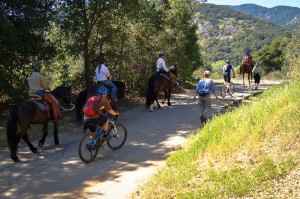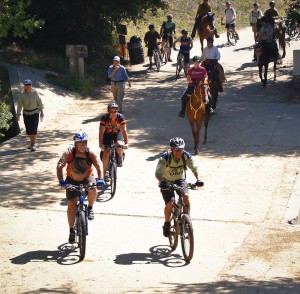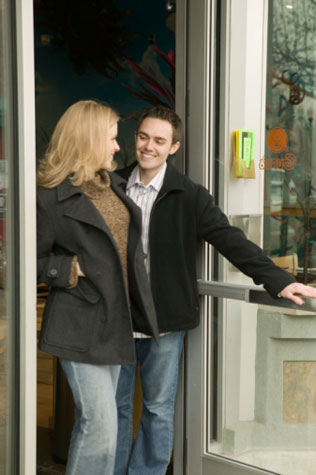Officials in Mexico’s capital have parked bikes in key areas and, for a fee, made them available to commuters in hopes of making a dent in the city’s aggressive car culture and improving the air.
![53005300[1]](http://corbamtb.com/news/wp-content/uploads/2010/03/530053001-300x238.jpg)
The Ecobici program parks bikes in key spots in the capital for the use of commuters who pay an annual fee.
Take a vast, teeming megalopolis where the car is king, bicycle paths are few and motorists often seem determined to mow down anyone not tucked behind a steering wheel.
Now try talking residents into pedaling to work every day to help the environment.
That’s the task facing Mexico City officials, who have parked hundreds of bikes in busy neighborhoods in hopes of getting people to avoid cars and instead bicycle to the office, class or a lunch date.
The new project, called Ecobici, is modeled on bike-lending programs in such cities as Barcelona, Spain; Paris; and Copenhagen. Planners hope that by saturating certain Mexico City neighborhoods with the three-speed bikes, they can persuade residents to consider making cycling at least part of their daily commute.
Ecobici users pay a $24 yearly registration fee and get a membership card, which they can swipe across an electronic reader at any station to release a bicycle. Riders have free use for up to 30 minutes and are charged up to $3 an hour for longer intervals.
Yet it’s hard to envision a steeper road for bike commuting than chaotic, smoggy Mexico City, where 4 million vehicles joust for position and — this may sound familiar to Angelenos — many residents view riding the bus or subway as about as likely as space travel.
“A lot of people said, ‘You are crazy; bikes in Mexico City?’ But we have visited a lot of cities around the world that did it with success,” said Martha Delgado, environmental secretary for Mexico City’s government. “We have beautiful weather here. We need to recover space. We need to improve air quality.”
So far, city officials have placed 1,100 bikes at 85 stations in several busy neighborhoods near downtown. The areas were chosen as promising proving grounds because they boast a mix of residences and businesses.
The sturdy-looking red-and-white bikes, outfitted with a headlight and rack for belongings, also are sprinkled along the city’s premier boulevard, Paseo de la Reforma. The bikes and equipment cost $6 million.
About 2,600 people have signed up, far from the eventual target of 24,000. But use is picking up, officials say.
On a recent day, Ivan Lemale, a 21-year-old student, pedaled one of the city-provided bikes along a tree-shaded boulevard in the La Condesa neighborhood as he headed to an appointment.
Lemale, a self-described environmentalist, said he was among the first to join when the program began in February. He said he has used the service regularly for short trips around the urban center.
Moments earlier, an aggressive taxi driver had nearly plowed into him on the busy avenue. But Lemale was looking on the bright side.
“Bicycles and cars can coexist very well. The only thing is respect,” he said. “That is the solution.”
The idea isn’t fun, but function. Mexico City leaders see bike borrowing as a key link in a public transportation chain that includes the 4-decade-old subway and a 5-year-old express bus system, called Metrobus, which operates on 24 miles of dedicated lanes.
The sprawling capital is too big to pedal from one end to the other on a daily basis. But officials hope commuters use the bikes for the first or last leg of their journeys, making it easier to rely on public transportation rather than driving or taking a taxi.
In a city that adds 250,000 vehicles to the streets each year, the goal of Ecobici is to increase the share of trips people take by bicycle to 5%, from 1% now. Residents make about 30 million trips a day.
Some people complain that the annual fee is too high. And a lack of information has many others scratching their heads over the rows of shiny bicycles that have popped up where coveted parking spaces used to be.
The biggest barrier to turning capitalinos into bike commuters is what cyclists say is the lack of a bicycling culture here. Though plenty of brave souls get around by bike, motorists often treat cyclists — and pedestrians — as irritants. Bike paths don’t always connect with one another and, in the most crowded areas, are often occupied by cars anyway.
Mexico City officials are trying to alter that thinking.
The government of Mayor Marcelo Ebrard clears traffic from Paseo de la Reforma and other thoroughfares Sunday mornings to make room for cyclists and joggers. The nearly 3-year-old recreational program is popular and has given residents a tempting taste of what a cycling life here might feel like.
In addition, authorities recently issued a new traffic code spelling out riders’ right to share lanes with cars and requiring motorists to slow down when passing bicycles. They envision a day when Mexico City — huge, tumultuous and car-centered — hops on a bike to get places.
“If we want to have a future,” said Delgado, the environmental secretary, “we have to open the door to bikes in Mexico City.”
 NICA executive director Matt Fritzinger said, “We are very pleased to formalize our partnership with IMBA — the continued growth of high school mountain biking depends on trail access.” He added, “Riding bikes is a freedom all youth should enjoy, and parents greatly support their kids riding on trails away from the dangers of traffic. IMBA does an incredible job of working with communities to build and maintain sustainable trail systems that work for all trail users.”
NICA executive director Matt Fritzinger said, “We are very pleased to formalize our partnership with IMBA — the continued growth of high school mountain biking depends on trail access.” He added, “Riding bikes is a freedom all youth should enjoy, and parents greatly support their kids riding on trails away from the dangers of traffic. IMBA does an incredible job of working with communities to build and maintain sustainable trail systems that work for all trail users.”




![scotland[1]](http://corbamtb.com/news/wp-content/uploads/2011/06/scotland1.jpg) “The idea of a healthy adventure activity, where you can just pick up your bike and go, has grabbed the imagination of the mass market,” Katrina Morrison, Scottish Enterprise, told the BBC.
“The idea of a healthy adventure activity, where you can just pick up your bike and go, has grabbed the imagination of the mass market,” Katrina Morrison, Scottish Enterprise, told the BBC.![53005300[1]](http://corbamtb.com/news/wp-content/uploads/2010/03/530053001-300x238.jpg)

